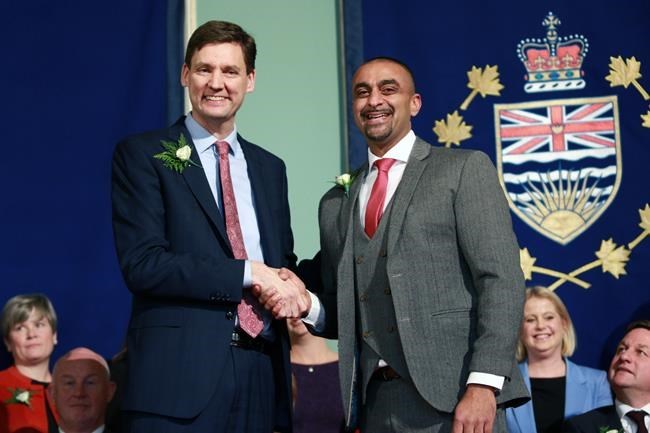VICTORIA — The British Columbia government will invest billions of dollars to ease a housing "crisis that is touching people in every corner of the province," Premier David Eby said.Â
The province released its so-called Homes for People plan on Monday starting with a $4-billion investment over three years and commits to $12 billion over a decade.Â
There are incentives to build and increase density, plans for supportive housing for those who are homeless, zoning changes that make basement suites legal across the province and a crackdown down on house flippers that Eby said are driving prices higher.Â
"It's impacting quality of life in our communities and it's holding back our entire economy," Eby said of the housing crisis during a news conference in Victoria.
"Businesses are struggling to attract workers who can't afford to live in the communities where the jobs are."
As part of the plan, Housing Minister Ravi Kahlon said the government will introduce provincial legislation this fall to allow three to four homes on a traditional single-family detached lot with additional density permitted in areas well served by transit.
"This means no more long zoning processes just to build a duplex, a triplex or a row home. Without more of these types of homes, we risk pushing more of our next generation out of this province," Eby said.
Jen Ford, president of the Union of B.C. Municipalities, said the organization, which represents 188 local governments, is still reviewing the province's plan and consulting with its members.
"We certainly see that the government is moving on this, but how that impacts land-use decisions, transit decisions, is really important to our membership," she said.
"So, we're looking for strong consultation with our members before that regulation is put in place."Â
Ford said increasing the supply of affordable rental units is important.
"We want to understand what that means for local governments, and their planning process and how the rollout of this blanket policy, how that impacts different local governments," she said.
Both Eby and Kahlon are slated to speak at the organization's housing summit this week in Vancouver.Â
Additional legislation will be introduced this year to allow secondary suites in every community across the province, something normally left up to the municipalities.
Homeowners will be able to access a forgivable loan of 50 per cent of the cost of basement suite renovations, up to a maximum of $40,000 over five years. But they'll have to rent those suites at below market rate for at least five years.
The pilot program is expected to be open next year to at least 3,000 homeowners for the first three years.
Eby is also promising a flipping tax to discourage speculation.
"We'll be designing this tax to ensure that it achieves the goal, which is getting away from people buying a home to hold it for a short period of time and sell it for a higher price driving costs higher," he said.
"If you are holding a home right now that you intend to flip, if you are thinking about buying a home for the purposes of flipping it, the message today is that this tax is coming, it will cost you money.Â
"So, stop engaging in that activity. Homes are for British Columbians to live in this province."
The government is also promising to beef up enforcement of short-term rentals, and streamline and modernize the building permit process to cut costs and speed up approvals.Â
The Greater Vancouver Board of Trade said the move to enable more units on a single lot "is a positive step forward."Â
"Initiatives to speed up permitting and approvals and enact digital permitting are also welcome. A significant challenge to building the housing we need is the lengthy permitting processes, which can often take five to seven years in the City of Vancouver," it said in a statement.
"We also appreciate efforts to close encampments and better support people experiencing homelessness."
Reducing homelessness is a key part of the plan, with a proposal to add 3,900 new supportive housing units and 240 complex care spaces.
It will also include teams designed to quickly respond to encampments and support those who are living outdoors.Â
Green Party MLA Adam Olsen said the plan has good policy choices including the legislation for increased density, a one-stop shop permitting process, and increased funding for social housing programs.Â
But he said there needs to be more specifics about the initiatives and a transparent timeline for when they will be introduced.Â
Any efforts to address encampments need to be compassionate and non-violent, he said.
“The provincial economy is deeply entrenched in our overblown housing market. If the B.C. NDP are going to truly, permanently, solve the housing crisis, they are going to have to take a hard look at the provincial books and our reliance on housing wealth as replacement for a robust social safety net."
This report by The Canadian Press was first published April 3, 2023.Â
The Canadian Press




